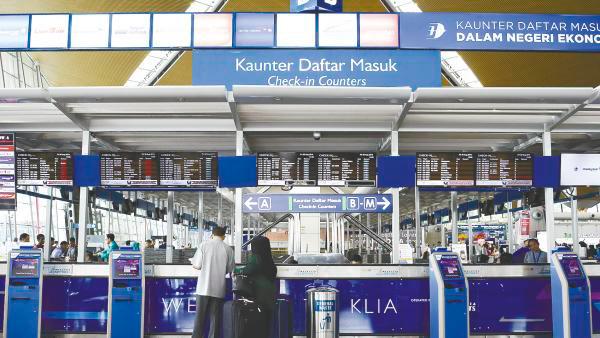IT has been around two months since the Employees Provident Fund (EPF) and Khazanah announced plans to take the Malaysia Airports Holdings Bhd (MAHB) private.
However, what is saddening is that we still have not gotten past the polemic about the involvement of the proposed partners of the corporate exercise should the deal materialise.
I think we are missing the forests for the trees. Let us go back to the basics: The proposal is aimed at beefing up the operations of MAHB, which manages 39 airports in the country. Let us be honest. Malaysia’s airports now are a pale shadow of its former glory days.
In March, KLIA was ranked the eighth worst airport in Asia by Skytrax. Compared with 2001, where it was ranked the second best airport in the world. What a shame.
The recent announcement of leaky roofs at Gate six adds to the woes of our major airport and exposes the reality that the infrastructure is crumbling.
According to the International Air Transport Association, Malaysia is already lagging behind its regional competitors. In 2023, KLIA recorded only 76% of its pre-pandemic traffic in 2019, behind Manila (95%) and Singapore (86%). This is in spite of Malaysia charging among the lowest aeronautical charges in the region.
Beyond statistics and surveys, longtime users of Malaysian airports such as KLIA and the Sultan Abdul Aziz Shah Airport in Subang know the painful experience of long queues, baggage handling problems and air-condition breakdowns.
Recently, a friend remarked that the Lombok Airport in Indonesia is much better than the Subang Airport. Put another way, our airports need urgent upgrades if we are serious about drawing travellers. The proposal by EPF and Khazanah sets out to do just that.
Under the proposal, a consortium will be set up where EPF and Khazanah will collectively hold a 70% stake in MAHB. The remaining 30% will be held by the Abu Dhabi Investment Authority and funds managed by Global Infrastructure Partners (GIP), one of the world’s premier infrastructure investors and an experienced airport owner and manager.
The fact is that GIP has a track record in turning around airports throughout the world. For example, when it took over the Edinburgh Airport in 2012, passenger numbers rose from 9.2 million to 14.4 million last year. The number of destinations also increased to 225 from 141. Connectivity improved. That is what Malaysian airports really need now. It needs to improve connectivity so we can become a competitive hub once again.
Other pain points of course at our airports are security wait-time and the embarrassing breakdown of the aerotrain.
At the Sydney Airport, GIP’s involvement saw decreased security wait-times by more than 60% to 11 minutes. At Gatwick, GIP completed their train replacement (same model and track length as KLIA’s Aerotrain) within 10 months and increased passenger throughput from 220 to 550 passengers per hour.
I think we should just let the professionals do their jobs. We have lost so much time and ground, and missing the point that we need to make Malaysian airports competitive again.
We are only bickering because GIP is in the midst of being acquired by BlackRock, a global asset manager, which also holds stakes in arms manufacturers that provide weapons to Israel.
While we bicker over this, some detractors conveniently ignore the fact that BlackRock already owns some RM27.5 billion of assets in Malaysia, including RM7 billion in government and corporate bonds. They say it is a small stake, hence, it is acceptable. So, why the double standards? It is getting clear that political voices that argue this line is doing it for the sake of politics.
Moreover, Malaysian entities will hold 70% of the shareholding post privatisation and they will make the key decisions. Politicians, of all people, should know that 70% is a strong majority control – 30% cannot trump 70%.
We should not lose the plot, and we have no time to lose. Let us not lose sight of the big picture, failing which our airports will only continue to deteriorate at the expense of this country’s socioeconomic well-being.
We need to elevate our airports to be global leaders, urgently. It is a matter of national pride.









